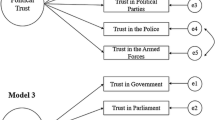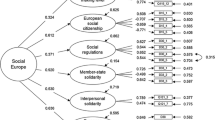The community put the legislative power into such hands as they think fit, with this trust, that they shall be governed by declared laws—John Locke (1632/1956).
Abstract
Political trust is seen as an important attribute in contemporary representative democracy. Political trust can cause social trust, foster associational life and make the efficient implementation of policy easier. Political trust can also be seen as a measure of political integration of migrants in Europe. However, if we want to measure this, we need to know for sure that we measure the same concept in all countries and among all cultural groups under research. This paper describes and tests four (existing) models of political trust. We find that there are multiple dimensions of political trust that can be modeled in a structural equation model. Furthermore, we research the cross-cultural equivalence of this measurement model in 22 European Union countries among natives, EU-migrants and non-EU migrants in these countries. Our results indicate that we can compare levels of political trust within countries pretty well, however, we should be careful comparing levels of political trust between EU countries since full scalar equivalence could not be reached. On a substantive note, we find quite some differences between the EU countries concerning the political trust natives have and we find diverging results concerning the migrants. In most countries we did not find a significant difference between migrants and natives. However, when the difference was significant, migrants showed higher levels of political trust in most instances.




Similar content being viewed by others
References
Abrajano, M. A., & Alvarez, R. M. (2010). Assessing the causes and effects of political trust among U.S. Latinos. American Politics Research, 38(1), 110–141.
Allum, N. S. R., & Sturgis, P. (Eds.). (2011). Evaluating change in social and political trust in Europe (Cross-cultural analysis: methods and applications). New York: Routledge.
Billiet, J. (2003). Cross-cultural equivalence with structural equation modeling. In J. A. Harkness, F. J. R. Van de Vijver, & P. P. Mohler (Eds.), Cross-cultural survey methods (pp. 247–264). New York: Wiley.
Brehm, J., & Rahn, W. (1997). Individual-Level Evidence for the Causes and Consequences of Social Capital. American Journal of Political Science, 41(3), 999–1023.
Byrne, B. M., Shavelson, R. J., & Muthén, B. (1989). Testing for the equivalence of factor covariance and mean structures: The issue of partial measurement invariance. Psychological Bulletin, 105(3), 456–466. doi:10.1037/0033-2909.105.3.456.
Chanley, V. A. (2002). Trust in government in the aftermath of 9/11: Determinants and consequences. Political psychology, 23(3), 469–483.
Citrin, J. (1974). The political relevance of trust in government. The American Politican Science Review, 68(3), 973–988.
Damico, A. J., Conway, M. M., & Bowman, S. D. (2000). Patterns of political trust and mistrust: three moments in the lives of democratic citizens. Polity, 32(3), 377–400.
Davidov, E. (2009). Measurement equivalence of nationalism and constructive patriotism in the ISSP: 34 countries in a comparative perspective. Political Analysis, 17(1), 64–82. doi:10.1093/pan/mpn014.
Dronkers, J., & Fleischmann, F. (Eds.). (2010). The educational attainment of second generation immigrants from different countries of origin in the EU-member-states (Quality and inequality of education. Cross-national perspectives). Dordrecht/Heidelberg/London/New York: Springer.
Dronkers, J., & Vink, M. (2012). Explaining access to citizenship in Europe: How citizenship policies affect naturalisation rates. European Union Politics, 13(3), 390–412.
Ehin, P. (2007). Political support in the baltic states, 1993–2004. Journal of Baltic Studies, 38(1), 1–20. doi:10.1080/01629770701223486.
ESS Round 4 data file edition 4.0. (2008). Norwegian social science data services, Norway—Data archive and distributor of ESS data.
European Social Survey, E. R. (2011). ESS-4 2008 documentation report. Edition 4.0. Bergen, European social survey data archive, Norwegian social science data services.
European Social Survey Round 4, E. R. (2007). European social survey round 4: Specification for participating countries.
Eurostat. (2013). Eurostat data explorer. http://appsso.eurostat.ec.europa.eu/nui/submitViewTableAction.doVisited. Jan 5th 2013.
Gallagher, M., & Mitchell, P. (2008). The politics of electoral systems. Oxford: Oxford University Press.
Gormley-Heenan, C., & Devine, P. (2010). The ‘us’ in trust: Who trusts Northern Ireland’s political institutions and actors? Government and opposition, 45(2), 143–165. doi:10.1111/j.1477-7053.2009.01308.x.
Guillen, L., Coromina, L., & Saris, W. E. (2011). Measurement of social participation and its place in social capital theory. Social Indicators Research, 100(2), 331–350. doi:10.1007/s11205-010-9631-6.
Hetherington, M. J. (1998). The political relevance of political trust. The American Politican Science Review, 92(4), 791–808.
Hox, J., De Leeuw, E. D., & Brinkhuis, M. J. S. (Eds.). (2010). Analysis models for comparative surveys (Survey methods in multicultural, multinational and multiregional contexts). Hoboken (NJ): Wiley.
Hu, Lt., & Bentler, P. M. (1999). Cutoff criteria for fit indexes in covariance structure analysis: Conventional criteria versus new alternatives. Structural Equation Modeling: A Multidisciplinary Journal, 6(1), 1–55. doi:10.1080/10705519909540118.
IDEA. (2013). Institute for democracy and electoral assistence. http://www.idea.int/vt/viewdata.cfm.Visited January 5th 2013.
Kesler, C., & Bloemraad, I. (2010). Does immigration erode social capital?. The conditional effects of immigration-generated diversity on trust, membership and participation across 19 countries, 1981–2000. Canadian Journal of Political Science, 43(2), 319–347. doi:10.1017/s0008423910000077.
Kim, J. (2005). “Bowling togehter” isn’t a cure-all: The relationship between social capital and political trust in South Korea. International Political Science Review, 26(2), 193–213. doi:10.1177/0192512105050381.
Kline, R. B. (2005). Principles and practices of structural equation modeling (2nd ed.). New York: The Guilford press.
Kohler, U. (2007). Surveys from inside: An assessment of unit nonresponse bias with internal criteria. Survey Research Methods, 1(2), 55–67.
Lenard, P. T. (2009). Trust your compatriots, but count your change: the roles of trust, mistrust and distrust in democracy. Political Studies, 56(2), 312–332. doi:10.1111/j.1467-9248.2007.00693.x.
Locke, J. (1632 [1956]). The second treatise of government: An essay concerning the true original, extent end fo civil government and: a letter concerning toleration. Oxford: Blackwell.
Lühiste, K. (2006). Explaining trust in political institutions: Some illustrations from the Baltic states. Communist and post-communist studies, 39(4), 475–496. doi:10.1016/j.postcomstud.2006.09.001.
Maxwell, R. (2010). Trust in government among British Muslims: the importance of migration status. Political Behavior, 38(1), 89–109.
Meredith, W. (1993). Measurement invariance, factor analysis and factorial invariance. Psychometrika, 58(4), 525–543. doi:10.1007/bf02294825.
Meuleman, B., Davidov, E., & Billiet, J. (2009). Changing atittudes toward immigration in Europe, 2002–2007: a dynamic group conflict theory approach. Social Science Research, 38(2), 352–365. doi:10.1016/j.ssresearch.2008.09.006.
Miller, A. H. (1974a). Political issues and trust in government: 1964–1970. The American Politican Science Review, 68(3), 951–972.
Miller, A. H. (1974b). Rejoinder to “comment” by Jack Citrin: political discontent or ritualism? The American Politican Science Review, 68(3), 989–1001.
Mishler, W., & Rose, R. (2001). What are the origins of political trust? Testing institutional and cultural theories in post-communist societies. Comparative Political Studies, 34(1), 30–62. doi:10.1177/0010414001034001002.
Muthén, L. K., & Muthén, B. O. (1998-2010). Mplus user’s guide: (6th ed.). Los Angeles: Muthén & Muthén.
Myrberg, G. (2011). Political integration through associational affiliation? Immigrants and native Swedes in Greater Stockholm. Journal of Ethnic and Migration Studies, 37(1), 99–115.
Oskarsson, S. (2010). Generalized trust and political support: A cross-national investigation. Acta Politica, 45(4), 423–443. doi:10.1057/ap.2010.3.
Papadakis, E. (1999). Constituents of confidence and mistrust in Australian institutions. Australian Journal of Political Science, 34(1), 75–93. doi:10.1080/10361149950470.
Putnam, R. D. (2001). Bowling alone. The collapse and revival of American community. (New edition ed.): Fireside Books.
Putnam, R. D. (2007). E Pluribus Unum: Diversity and Community in the Twenty-first Century The 2006 Johan Skytte Prize Lecture. Scandinavian Political Studies, 30(2), 137–174. doi:10.1111/j.1467-9477.2007.00176.x.
Reeskens, T., & Hooghe, M. (2002). Cross-cultural measurement equivalence of generalized trust. Evidence from the European Social Survey. Social Indicators Research, 85(3), 515–532. doi:10.1007/s11205-007-9100-z.
Rothstein, B., & Stolle, D. (2008). The state and social capital. An instituional theory of generalized trust. Comparative Politics, 40(4), 441–467.
Rudolph, T. J., & Evans, J. (2005). Political trust, ideology and public support for government spending. American Journal of Political Science, 49(3), 660–671.
Schildkraut, D. J. (2005). The rise and fall of political engagement among Latinos: the role of identiy and preceptions of discrimination. Political Behavior, 27(3), 285–312.
Schyns, P., & Koop, C. (2010). Political distrust and social capital in Europe and the USA. Social Indicators Research, 96(1), 145–167. doi:10.1007/s11205-009-9471-4.
Steenkamp, J. E., & Baumgartner, H. (1998). Assesing measurement invariance in cross-national consumer research. Journal of consumer research, 25(1), 78–90.
Strömblad, P., & Adman, P. (2010). Political Integration through ethnic or nonethnic voluntary associations. Political Research Quarterly, 63(4), 721–730.
Tillie, J. (2004). Social capital of organisations and their members: Explaining the political integration of immigrants in Amsterdam. Journal of Ethnic and Migration Studies, 30(3), 529–541.
Tocqueville, A. d. (1835 [1969]). Democracy in America. Garden City, NY: Doubleday.
Van der Brug, W., & Van Praag, P. (2007). Erosion of political trust in the Netherlands: Structural or temporarily? A research note. Acta Politica, 42(4), 443–458. doi:10.1057/palgrave.ap.5500203.
Wong, T. K., Hsiao, H. M., & Wan, P. (2009). Comparing political trust in Hong Kong and Taiwan: Levels, determinants and implications. Japanese Journal of Political Science, 10(2), 147–174. doi:10.1017/S146810990900351X.
Zmerli, S., & Newton, K. (2008). Social trust and attitudes towards democracy. Public opinion quarterly, 72(4), 706–724. doi:10.1093/poq/nfn054.
Acknowledgments
We want to thank Bart Meuleman (Leuven University), Ellen Jansen (University of Groninen) and the participants at the RC33 conference in Sydney for their useful comments on this paper.
Author information
Authors and Affiliations
Corresponding author
Rights and permissions
About this article
Cite this article
André, S. Does Trust Mean the Same for Migrants and Natives? Testing Measurement Models of Political Trust with Multi-group Confirmatory Factor Analysis. Soc Indic Res 115, 963–982 (2014). https://doi.org/10.1007/s11205-013-0246-6
Accepted:
Published:
Issue Date:
DOI: https://doi.org/10.1007/s11205-013-0246-6




